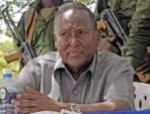 almotamar.net Google
almotamar.net Google - MOGADISHU (Reuters) - A Somali gunman opened fire on an Ethiopian military convoy in Mogadishu on Saturday, triggering a heavy shootout that caught civilians in the crossfire and killed at least four people, witnesses said.
The attack -- following mortar strikes on the presidential palace on Friday -- was the latest in a guerrilla-style campaign against the Somali government and their Ethiopian military allies who drove Islamists out of the city.
Witnesses said that after the Somali attacker began firing with an AK-47, the Ethiopian convoy travelling through north Mogadishu opened up with an anti-aircraft gun.
Panicked bystanders fled for cover and a tank ran over a minibus in the bloody melee, they said.
"We were just setting up our shops when this happened," said an injured woman, writhing from bullet wounds in her back at Mogadishu's Medina hospital. "A single gunman opened fire at the Ethiopian convoy, and the Ethiopians returned heavy fire."
Four people died and about a dozen were injured, the witnesses told Reuters, indicating it was civilians who were mainly affected. It was not known if the gunman died.
The African Union (AU), which approved a peacekeeping force for Somalia late on Friday, said the unabated violence in Mogadishu showed the need for quick deployment.
The AU's peace and security council approved a 7,650-strong force, just minutes before attackers struck Mogadishu's hilltop Villa Somalia with five mortars after dark on Friday.
President Abdullahi Yusuf, who moved there after the recent ousting of Islamists who had controlled most of south Somalia for six months, was inside but unhurt, government sources said.
A late-night gunfight ensued outside the palace between the guards and assailants, who melted back into the streets.
"This shows the need for deployment as soon as possible," AU peace and security commissioner Said Djinnit said after the formal approval of a six-month peacekeeping mission.
ETHIOPIA WANTS OUT
Many doubt the AU's capacity to muster such a force, let alone tame Somalia. It has been in chaos since the 1991 ousting of a dictator and defied U.S. and U.N. peacekeepers in the early 1990s in a mission shown in the "Black Hawk Down" film.
Only Uganda has publicly vowed to supply troops. But Djinnit said a second, unnamed country had also pledged to contribute, meaning the first three of nine planned 850-soldier AU battalions could go in "within weeks".
The AU, whose peacekeepers in Sudan's Darfur region have failed to halt the conflict there, wants the United Nations to take over after six months. But it is not at all clear whether the world body's members want to take on such a mission.
Suspicion for the Mogadishu attacks has fallen squarely on the Islamists. They have repeatedly vowed to hit back with guerrilla tactics after their surprisingly quick defeat by government-Ethiopian forces over Christmas and the New Year.
Scattered to remote parts of the south near the border with Kenya, some Islamists have begun returning to Mogadishu in disguise, according to sources in the movement.
Yusuf, 72, arrived in Mogadishu just days ago to take up residence in the bullet- and rocket-scarred building that used to house former dictator Mohamed Siad Barre.
Facing multiple threats from the Islamists, returning warlords, clan rivalries and the prevalence of guns, the government has a momentous challenge to impose order.
Set up at a peace conference in Kenya in 2004, the government's mandate runs out in 2009. It has international support from the U.N., United States and others, but lacks a genuinely popular power base inside Somalia.
Diplomats fear a dangerous vacuum once Ethiopian troops propping up the government return home. Prime Minister Meles Zenawi has said he wants to withdraw them within days, adding urgency to the diplomatic push to create a peacekeeping mission.
